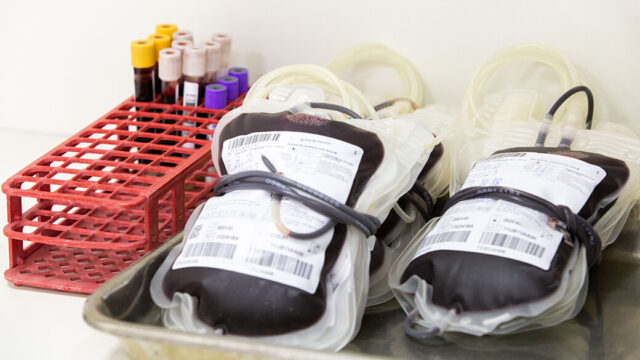Every 2 seconds, someone in the U.S. needs blood, platelets, or both. This translates to 16 million blood components transfused in patients annually. But how safe is our blood supply from emerging pathogens, and what is being done to protect it? In what ways can transfusion outcomes be maximized to enhance benefits to patients over their lifetimes? To answer these and other questions is Westat’s Holly Sawyer, MPH, a Senior Research Associate for Clinical Research.
Q. How do biomedical informatics and data coordination contribute to advancing safety and effectiveness in transfusion medicine research?
A. Biomedical informatics, particularly through data transformation partnerships, improves transfusion medicine by standardizing a range of data sources related to blood product quality, donor demographics, and transfusion practices. By linking the donor, blood components, and recipient data, investigators can analyze all aspects of blood transfusion medicine using 1 database. This ultimately enables easier data analysis, which can improve blood transfusion safety and clinical practices.
Q. What are the biggest challenges in harmonizing data across multiple hospitals, blood centers in research hubs, and international partners, and what strategies have proven most effective in overcoming them?
A. Among the biggest challenges are inconsistent coding practices and regulatory variances. But with data transformation partners, these barriers can be surmounted by providing and ensuring standardized data structures that promote interoperability. Westat uses several successful strategies to overcome these challenges. These include ongoing collaboration between the data coordinating center and investigators during data collection, open communication with continuous quality control, and a standardized model for hospitals and blood centers to format and share data with coordinating centers such as Westat.
Q. How are advances in data infrastructure, systems engineering, and analytics helping researchers generate faster, more reliable insights for transfusion medicine?
A. Advancements in data infrastructure, such as the use of cloud-based platforms (like Amazon Web Services [AWS]) and real-time data analytics, allow investigators to process large amounts of information efficiently and accurately. By leveraging robust data systems and sophisticated analytic tools, investigators can quickly assess the quality of blood products, evaluate the safety of transfusions, and correlate donor population variables with clinical outcomes. Systems engineering innovations, such as automated data pipelines and advanced machine learning (ML) algorithms, speed the identification of key variables (e.g., transfusion reactions, health insights), improving response times and research outcomes.
Data coordinating centers, such as Westat, can quickly respond to emerging threats by using flexible data architectures that enable real-time collection and analysis.
Holly Sawyer, MPH, Senior Research Associate, Clinical Research
Q. Blood safety can be affected by emerging diseases and new public health threats. How can a data coordinating center rapidly pivot to respond to these challenges?
A. Data coordinating centers, such as Westat, can quickly respond to emerging threats by using flexible data architectures that enable real-time collection and analysis. Establishing emergency response protocols, engaging in proactive surveillance of emerging diseases, and using predictive analytics can assist in adapting strategies quickly, ensuring that blood safety measures are updated in response to new public health threats. We are skilled in responding to emerging infectious threats, such as fatal respiratory diseases, dengue fever, and the Oropouche virus, through robust active surveillance of arboviruses.
Q. What roles do clear communication and data dissemination play in ensuring that findings from transfusion medicine research are translated into better practices and policies?
A. Clear communication and effective data dissemination are critical in translating research findings to improved practices and policies. Regular updates to program investigators foster transparency and understanding while also building opportunities for further collaboration, which can lead to better refinements of ongoing analytic work.
Disseminating findings through blood safety and transfusion-related conferences and journals—via abstracts, manuscripts, and presentations—helps target audiences adopt best practices and policies that improve transfusion medicine safety and efficacy.
Q. At the end of the day, how does this kind of research make a difference for patients and families across the U.S. who rely on the safety and availability of the blood supply?
A. Research in transfusion medicine, particularly research focused on blood product quality and the donor population, has a profound impact on patients and families across the U.S. By expanding research initiatives to include populations like infants, children, and adults, investigators have been able to ensure greater safety standards, enhancing the reliability of the blood supply. This increases families’ confidence in the healthcare system and the safety of transfusions, fostering trust in medical interventions and improving health outcomes.
Focus Areas
Biomedical Informatics and Data Coordination Clinical Infrastructure and Support Clinical Research Coordinating Centers Disease Surveillance Public Health Real-World Data and EvidenceCapabilities
Advanced Technologies Biomedical Informatics and Data Coordination Data Analytics, Clinical Data Science, and AI Data Collection Data Integration, Harmonization, and Complex Analytics Data Quality Data Science Infrastructure and Security Machine Learning and Artificial Intelligence Research Network CoordinationFeatured Expert

Holly Sawyer
Senior Research Associate
-
Perspective
Strategies for Expanding Access to Healthcare in Rural SettingsFebruary 2026
Rural communities face multiple barriers to accessing healthcare, including limited facilities, lengthy travel distances, fewer providers, and long wait times for some services. These challenges…
-
Perspective
Westat Experts Explore the Future of Quantum ComputingJanuary 2026
Westat experts joined other leading researchers, government innovators, industry partners, and students at Unlocking the Potential of Quantum Computing: A Symposium for the Quantum-Curious, hosted…
-
Perspective
Workforce Development Drives Solutions to Rural Healthcare ShortagesDecember 2025
Rural communities face disproportionate shortages of healthcare professionals, resulting in diminished access to care, longer wait times, fewer available services, and, ultimately, poorer health outcomes.…
